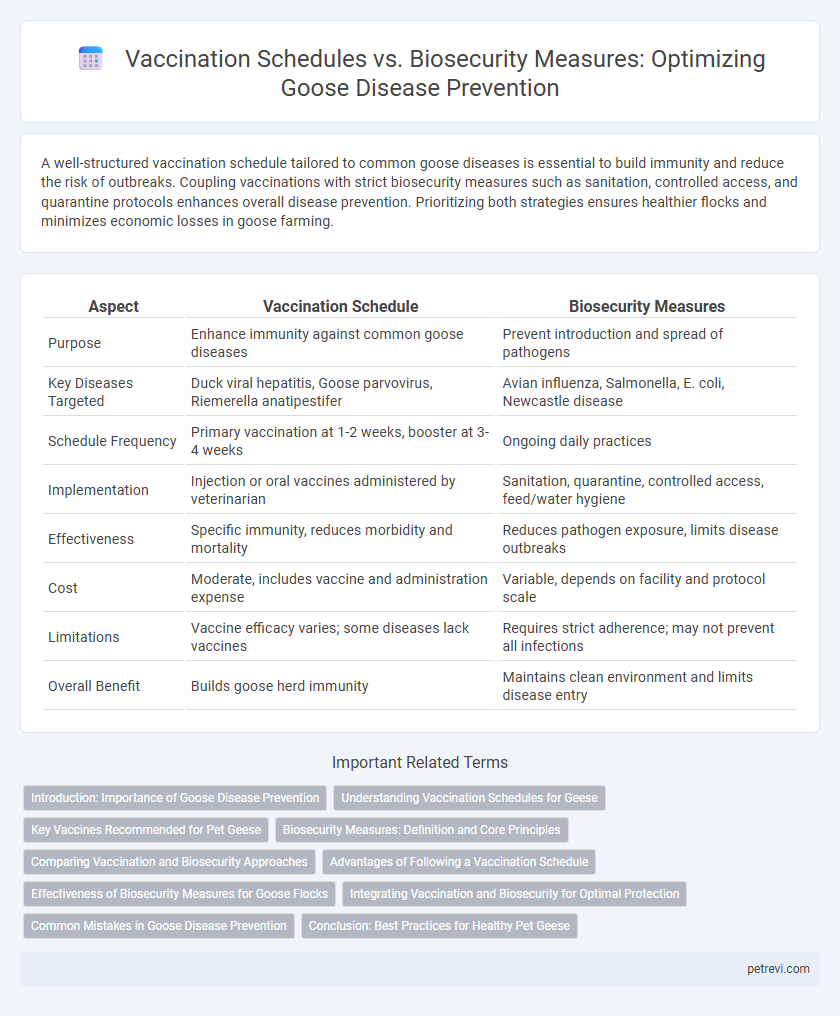A well-structured vaccination schedule tailored to common goose diseases is essential to build immunity and reduce the risk of outbreaks. Coupling vaccinations with strict biosecurity measures such as sanitation, controlled access, and quarantine protocols enhances overall disease prevention. Prioritizing both strategies ensures healthier flocks and minimizes economic losses in goose farming.
Table of Comparison
| Aspect | Vaccination Schedule | Biosecurity Measures |
|---|---|---|
| Purpose | Enhance immunity against common goose diseases | Prevent introduction and spread of pathogens |
| Key Diseases Targeted | Duck viral hepatitis, Goose parvovirus, Riemerella anatipestifer | Avian influenza, Salmonella, E. coli, Newcastle disease |
| Schedule Frequency | Primary vaccination at 1-2 weeks, booster at 3-4 weeks | Ongoing daily practices |
| Implementation | Injection or oral vaccines administered by veterinarian | Sanitation, quarantine, controlled access, feed/water hygiene |
| Effectiveness | Specific immunity, reduces morbidity and mortality | Reduces pathogen exposure, limits disease outbreaks |
| Cost | Moderate, includes vaccine and administration expense | Variable, depends on facility and protocol scale |
| Limitations | Vaccine efficacy varies; some diseases lack vaccines | Requires strict adherence; may not prevent all infections |
| Overall Benefit | Builds goose herd immunity | Maintains clean environment and limits disease entry |
Introduction: Importance of Goose Disease Prevention
Goose disease prevention relies heavily on a balanced approach combining a well-structured vaccination schedule with stringent biosecurity measures to minimize pathogen exposure. Vaccination programs targeting common diseases like avian influenza and Newcastle disease enhance immune defense, reducing morbidity and mortality rates in flocks. Implementing comprehensive biosecurity protocols, including sanitation, controlled access, and quarantine procedures, effectively reduces transmission vectors and supports overall flock health.
Understanding Vaccination Schedules for Geese
Vaccination schedules for geese are critical in preventing diseases such as avian influenza and Newcastle disease by administering vaccines at specific ages to maximize immune response. Timely vaccinations, aligned with the bird's developmental stages, enhance protection against common pathogens and reduce the risk of outbreaks. Integrating these schedules with rigorous biosecurity measures ensures optimal health management and minimizes disease transmission within flocks.
Key Vaccines Recommended for Pet Geese
Key vaccines recommended for pet geese include those targeting Newcastle disease, avian influenza, and infectious bronchitis, essential for preventing widespread viral outbreaks. A strict vaccination schedule combined with rigorous biosecurity measures such as quarantine, sanitation, and controlled access to flocks significantly enhances disease prevention. Regular health monitoring and timely administration of vaccines reduce the risk of infection and improve overall flock health.
Biosecurity Measures: Definition and Core Principles
Biosecurity measures for goose disease prevention involve practices designed to minimize the introduction and spread of infectious agents on farms, including controlled access, sanitation protocols, and wildlife exclusion. Core principles emphasize maintaining clean environments, isolating new or sick birds, and monitoring flock health regularly to detect early signs of disease. Implementing strict biosecurity reduces reliance on vaccination schedules by preventing outbreaks before they occur, ensuring overall flock health and productivity.
Comparing Vaccination and Biosecurity Approaches
Vaccination schedules for geese typically target specific diseases such as avian influenza and Newcastle disease, ensuring immunity development at critical growth stages. Biosecurity measures emphasize preventing disease introduction through hygiene protocols, controlled farm access, and sanitation practices, reducing pathogen exposure. Combining vaccination with stringent biosecurity enhances overall disease prevention by both building immunity and minimizing infection risks.
Advantages of Following a Vaccination Schedule
Following a vaccination schedule for geese ensures targeted immunity against prevalent diseases such as avian influenza and goose parvovirus, significantly reducing morbidity and mortality rates. Timely vaccinations enhance flock health by promoting robust immune responses, which decreases the reliance on antibiotics and minimizes disease outbreaks. Consistent adherence to vaccination protocols complements biosecurity measures by providing a proactive barrier to infections, optimizing overall disease prevention efficacy.
Effectiveness of Biosecurity Measures for Goose Flocks
Biosecurity measures for goose flocks, including strict sanitation protocols, controlled access to housing, and regular monitoring, significantly reduce the risk of infectious diseases such as avian influenza and Newcastle disease. Unlike vaccination schedules that target specific pathogens, biosecurity creates a comprehensive defense by minimizing exposure to various pathogens, ensuring healthier flocks and higher survival rates. Effective biosecurity implementation can decrease disease outbreaks by up to 70%, proving essential for sustainable goose farming.
Integrating Vaccination and Biosecurity for Optimal Protection
Integrating vaccination schedules with stringent biosecurity measures significantly enhances disease prevention in geese, reducing the incidence of viral infections such as avian influenza and goose parvovirus. Timely administration of vaccines, aligned with controlled farm access, disinfection protocols, and quarantine procedures, creates a multi-layered defense that minimizes pathogen transmission. Combining these strategies optimizes flock immunity and maintains overall health, ensuring sustainable production and minimizing economic losses.
Common Mistakes in Goose Disease Prevention
Common mistakes in goose disease prevention often involve neglecting the proper vaccination schedule, leading to insufficient immunity against prevalent pathogens like avian influenza and Pasteurella multocida. Overreliance on vaccines without robust biosecurity measures--such as controlled farm access, disinfection protocols, and isolation of new or sick birds--results in increased vulnerability to outbreaks. Implementing both timely vaccinations and stringent biosecurity protocols is critical to minimizing morbidity and mortality in commercial and backyard goose flocks.
Conclusion: Best Practices for Healthy Pet Geese
A comprehensive vaccination schedule tailored to common goose diseases like avian influenza and viral hepatitis significantly reduces infection risks. Strict biosecurity measures, including controlled access, sanitation protocols, and regular health monitoring, complement vaccine efficacy by minimizing pathogen exposure. Combining both strategies ensures optimal health and longevity in pet geese, promoting a disease-free environment.
Vaccination schedule vs Biosecurity measures for Goose disease prevention Infographic

 petrevi.com
petrevi.com